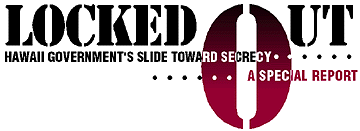

"The first thing is that government in Hawaii has often tried to keep things private that have no basis," said Portnoy, who is frequently hired by newspapers and television stations attempting to get government information made public.
"The government has forced the media to sue over such things as 911 tapes and the settlement of civil cases. The Legislature has tightened access to public meetings."

"Government is very open in Hawaii," Radcliffe says. "The only time you have records closed is when the case is moving through the process."
Former Gov. John Waihee, who set up a citizens panel to recommend changes to state information access laws, said: "When I first got elected, there was a heavy push to open records and to clarify what records should be open.
"The best way to do it seemed to be a commission of the competing interests."
The result was the state Uniform Information Practices Act, to be guided by the Office of Information Practices.
"The idea was for it (access) to be uniform, and if it (the government) was going to err it should be in favor of public disclosure," Waihee said.
"The government belongs to the people."
Robbie Alm, former director of the state Department of Commerce and Consumer Affairs, whom Waihee appointed to head open-records reform, said the proposed law wasn't going to make any legislators popular.
"The news media and Common Cause would appreciate it, but how many votes is that?" Alm said.
Later, Waihee admitted that the law was used by the news media to open records that proved to be embarrassing to him.
"I used to think the media could get practically anything it wanted, but that might have been part of my persecution complex," Waihee said.
"It wasn't an easy law to live with, but it was necessary."
The law reversed previously held assumptions about privacy rights and public records.
Under the act, all government records are considered public unless access is legally restricted because of clearly defined privacy concerns.
To set the law in motion, Waihee picked Kathleen "Katie" Callaghan, a former federal attorney and city deputy corporation counsel.
"Katie was strong," Alm said. "Warren (Price, former attorney general) put her in the key spot, and that was a critical decision."
With Callaghan helping to draft legislation, the open-records process was working, according to Alm.
But the present attorney general, Margery Bronster, didn't think Callaghan's work to require a computer catalog of every record maintained by the state was valuable, and Callaghan was not reappointed by Gov. Ben Cayetano.
Both Callaghan and Cayetano declined to be interviewed for this article.
Alm said today he thinks that the new stresses over the state's budget have forced open government into a secondary role.
"Government today is in the trenches fighting in a way that hasn't existed for a long time," said Alm, now a vice president with First Hawaiian Bank.
"I don't see people consciously saying they want to close records and turn this into a secret place," he said. "But I get a sense that in the fight for survival there are a lot of things left out; things get lost in the shuffle."
Champions of open government in Hawaii say more needs to be done to ensure that government obeys the Sunshine Law.Some say lack of public interest contributes to the problem. Even the Sunshine Coalition of Hawaii, while active, has seen better days.
Patricia Tummons, editor and publisher of Environment Hawaii, says someone needs to watch out for the public.
"How is a person who works a 9-to-5 job going to take off time to attend most of these meetings that are held during the day and make sure the areas that he or she has an interest (in) are kept open?" she said.
University of Hawaii journalism Professor Beverly Ann Keever said the coalition 20 years ago was made up of Common Cause Hawaii, the League of Women Voters, Honolulu Community-Media Council, the Society of Professional Journalists, the American Civil Liberties Union, the Hawaii Council of Churches and other groups.
"That was a time where every year, we would propose a bill and try and follow it through the Legislature and almost always lose...," Keever said.
"Now, we don't really meet as a group, but with the fax machine and everything, we just send drafts and notices around. And one of the problems is we only have such short notice to respond to a bill that's coming up that we just sort of swap position papers," she said.
Ah Jook Ku, executive secretary at the Honolulu Community-Media Council, said the makeup of the coalition changes yearly, depending on the issues. This past session was particularly active, she said, because of bills to amend the open-meetings law.
Desmond Byrne of Common Cause Hawaii admits that advocacy efforts are often left to groups like his instead of to the public.
"And we wish they would be more interested in it..." he said.
At one time, Common Cause and the League of Women Voters regularly monitored meetings, but not anymore.
Arlene Kim Ellis, past president of the league, said her group still monitors meetings of the state Ethics Commission, Campaign Spending Commission, Honolulu City Council and Legislature.
"I would say that we don't have the capability of sitting and monitoring everything, but we do make our presence known," Ellis said.